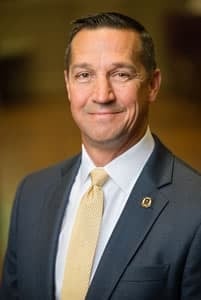You have /5 articles left.
Sign up for a free account or log in.

John Bogdan
University of North Carolina at Charlotte
A group of faculty and students at the University of North Carolina at Charlotte is calling for the university to dismiss the associate vice chancellor for safety and security over his record as former warden of the controversial prison camp at the U.S. Naval Station Guantánamo Bay in Cuba, which is used to house detainees charged with terrorism.
The American Association of University Professors chapter on campus sent a June 10 letter to university leadership calling for the dismissal of the associate vice chancellor, John Bogdan, renewing a student campaign for Bogdan’s removal that gained some momentum on campus last fall. The resumed push for Bogdan's ouster comes at a time when university policing is under increased scrutiny in the wake of protests across the country over police brutality directed at Black people.
UNC Charlotte’s chancellor, Philip L. Dubois, stands by the decision to hire Bogdan in December 2018, and praises his performance overseeing university police and several other campus units related to environmental health and safety, emergency management, and risk management and insurance. Bogdan, a retired Army colonel whose transition from a 34-year military career to university administration was profiled in The Charlotte Observer last December, did not respond to several requests seeking comment.
Bogdan oversaw the Guantánamo prison from 2012 to 2014. According to a university announcement about his hiring, his final position in the Army was as chief of police and chief of operations for Forces Command in Fort Bragg, N.C., a role in which "he was responsible for physical and operational security, force protection and antiterrorism capabilities for 11 major army installations in the United States."
The AAUP letter criticizes what its authors describe as Bogdan’s “egregious record in Guantánamo Bay,” and draws information from a 2013 letter from military and civilian lawyers representing prisoners held at Guantánamo. The defense attorneys’ letter to then Secretary of Defense Charles Hagel, which was printed in full by Al Jazeera, called for an examination of Bogdan’s “fitness for command,” citing “the rapidly deteriorating conditions under his command and his heavy-handed response to the current hunger strike.”
The defense attorneys' letter describes issues including the use of solitary confinement to discipline hunger-striking prisoners, “degrading bodily searches,” “the systematic seizure of attorney-client privileged materials by personnel,” “camp-wide temperature modifications,” “guard disruptions during attempted prayers” and restriction of prisoners’ access to religious materials.
The AAUP letter, which chapter president John Cox said was unanimously approved by the 37 chapter members who voted on it, makes clear that faculty are not faulting Bogdan’s military service, but instead his record at Guantánamo specifically. The letter also calls for UNC Charlotte leaders to disavow an internally circulated “fact set" defending Bogdan’s record at Guantánamo. (The document is appended in the letter and includes statements such as “John adhered to standard military practices for custodial searches, which are done to ensure the safety of both detainees and guards” and “John did not keep lights on unnecessarily or the temperature too low in the detention center.”)
“Given the justified national concerns about the militarization of police forces -- including campus police -- we suggest you start by dismissing John Bogdan; severing ties with the search firm that recommended him; disavowing the Chancellor’s internally circulated ‘Fact Set regarding Bogdan’; and creating an advisory council of faculty, students and police that would draw up a mandate for acceptable policing in our university,” the AAUP letter from June 10 states.
Dubois, who is retiring, responded to the AAUP almost immediately, on June 11.
DuBois wrote that administrators had already "taken considerable time to respond point-by-point to concerns regarding Mr. Bogdan’s hire" raised by Cox.
"It suffices to say at this point that we are going to have to agree to disagree on the version of the facts presented by the AAUP regarding the search process and Mr. Bogdan’s military service record," Dubois wrote.
Dubois said he was confident the search process was conducted appropriately and resulted in an “excellent hire.”
“Notwithstanding the AAUP’s characterization of Mr. Bogdan’s military experience, we are confident that, in his civilian capacity, he is fully capable of acting in a professional manner and adhering to the expectations we have with respect to the behavior of senior administrative officers. That confidence has been justified based on his performance to date,” Dubois wrote.
Dubois specifically praised Bogdan’s involvement in reviewing a shooting on campus on April 30, 2019 that killed two students and wounded four others.
“It is equally clear from Mr. Bogdan’s performance to date, including his exemplary work in leading the expansive efforts relating to the review of the events of April 30, 2019, and the COVID-19 campus recovery plan, that there is no basis to dismiss him from his position,” Dubois wrote.
Dubois added that he considered the matter closed “and will make no further response.” He also said he advised the incoming chancellor, who will assume the position after Dubois retires June 30, to do the same.
Cox, an associate professor in the department of global studies and director of the university’s Center for Holocaust, Genocide & Human Rights, said he thinks it is “distasteful to exploit the April 30 tragedy last year as like a post-facto way of justifying the hire.” He was disappointed by Dubois’s response.
“Right now there’s this powerful movement for racial justice,” Cox said. “Right in the midst of this when universities should at least be pretending to care more, which oftentimes is all they do -- it’s striking that right in the midst of all this that we would receive such a quick reply and that the reply would just cavalierly dismiss all of this evidence.”
Cade Lee, who was involved in the campaign to dismiss Bogdan before he graduated this year, faulted the university for “actively making that choice to ignore concerns that had been going on for years about Guantánamo in general, much less the specific actions of Bogdan.”
Lee cited allegations of human rights abuses during Bogdan's tenure at Guantánamo and raised specific concerns about the treatment of prisoners who practiced Islam. He said Bogdan was not qualified to keep UNC Charlotte students safe.
"The big problem is a human rights abuser working at a university in a position that’s supposedly designed to protect people when time and again he’s stripped people of their rights and specifically targeted minority religious groups, and also has no experience for the specific position as far as keeping civilians safe," Lee said.








